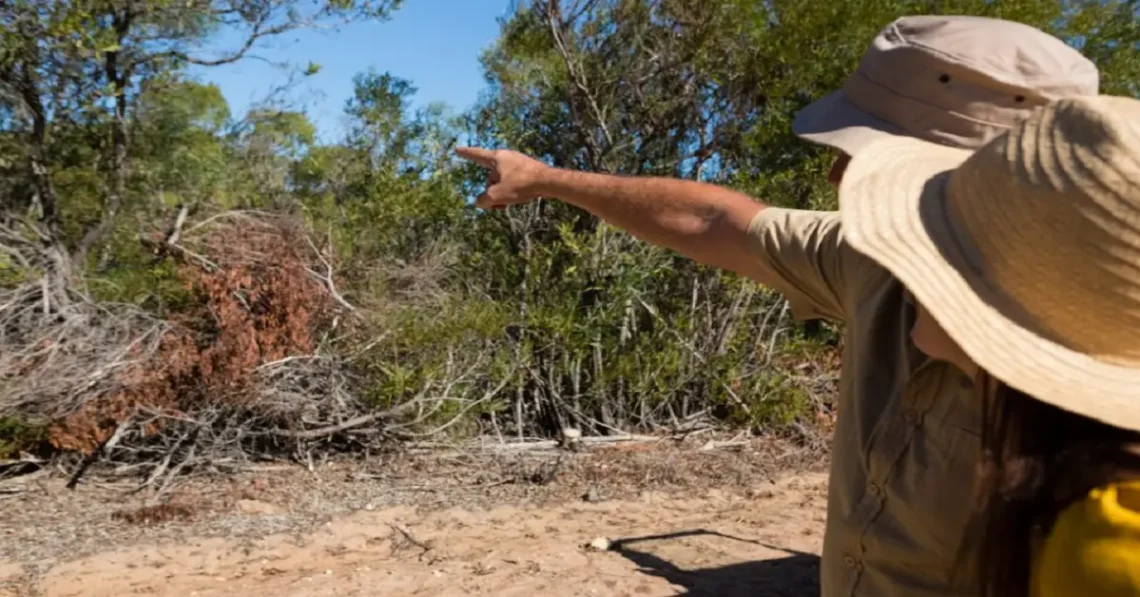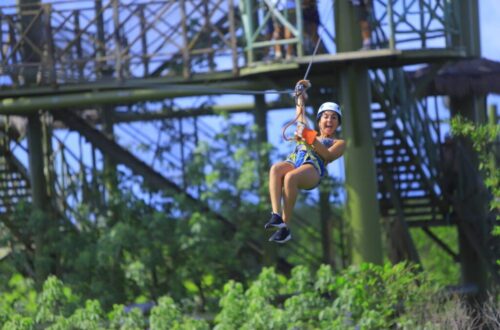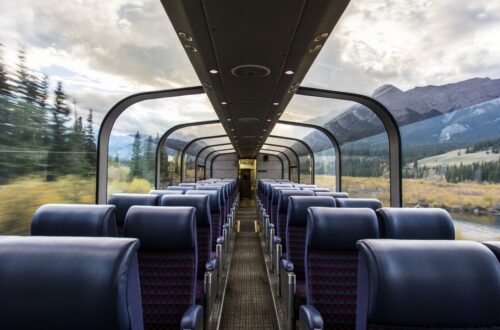Key Takeaways
- Botswana is a sanctuary where wildlife roam freely amidst a tapestry of diverse ecosystems.
- Viewing the Big Five in their natural habitat is a profound experience, enhanced by the wealth of birdwatching opportunities.
- The Okavango Delta offers a unique and thriving environment essential to the Botswana safari adventure.
- Cultural exchanges and community-driven tourism enrich the Botswana experience while foregrounding the importance of sustainability and conservation.
- Preparing for a Botswana safari is the first step in an unforgettable journey through the wilds of Africa.
Table of Contents
- An Unspoiled Haven for Wildlife Enthusiasts
- Experiencing the Big Five Up Close
- A Bird Watcher’s Paradise
- Exploring the Okavango Delta – A World Heritage Site
- Cultural Encounters and Community Tourism Initiatives
- Eco-friendly Lodges and Sustainability in Safari Tourism
- Navigating the Chobe River – A Gateway to Diversity
- Adventure Activities Beyond Game Drives
- Safari Photography – Capturing Magical Moments
- Planning Your Botswana Safari: Practical Advice
An Unspoiled Haven for Wildlife Enthusiasts
Botswana is one of the premier destinations for wildlife enthusiasts who yearn for an authentic experience in an uninterrupted natural environment. With its expanses ranging from the starkly beautiful Kalahari Desert, with its otherworldly silence, to the lush, verdant pathways of the Okavango Delta, Botswana’s commitment to conservation has been a steadfast approach to preserving the country’s natural splendor. This dedication has resulted in protecting desirable tracts of land, granting sanctuary to a broad spectrum of animal and plant life that flourish within well-managed, balanced ecosystems.
Integral to Botswana’s wildlife preservation endeavors are the robust conservation models trailblazed by the fusion of government efforts and private partnerships. These models have attracted global admiration and support, underscoring the importance of Botswana as a world leader in wildlife and habitat protection. A Botswana safari offers a window into nature reserves such as the vast expanses of the Central Kalahari Game Reserve, where the nights reverberate with the calls of nocturnal beasts, or the river-rich Linyanti Concessions that boast jaw-dropping herds of elephants and zebras.
For visitors, a trip to renowned parks such as Chobe National Park or the Moremi Game Reserve brings encounters with Africa’s most sought-after wildlife, including, but not limited to, majestic pride of lion, solitary leopards, and herds of buffalo, all coexisting in their natural, undisturbed landscapes. The sheer awe of watching these creatures in the wild, interacting, hunting, and existing as they have for millennia, is a privilege that leaves a lasting imprint and a profound appreciation for the endeavors that have made such experiences possible.
Experiencing the Big Five Up Close
Pursuing the Big Five—lion, leopard, rhinoceros, elephant, and Cape buffalo—has long been the quintessential objective for those embarking on a Botswana safari. Stepping into this incredible land cape, travelers quickly realize the true magnitude of witnessing these iconic animals in their natural surroundings. The longstanding dedication to eco-sensitivity in Botswana means that the excitement of spotting these creatures comes with the assurance that their habitat and well-being are being vigilantly safeguarded.
Any ethical wildlife viewing experience begins and ends with a profound respect for the animals and their surroundings. Visitors are encouraged to observe the Big Five from a comfortable distance, avoiding disruptions to natural behaviors and ensuring that both animals and humans remain safe. In Botswana, guides are not just drivers but custodians of the land and its residents, equipped with generations of knowledge they eagerly impart. They offer invaluable insights into finding the best spots to safely observe lions in their domain or elephants partaking in a twilight drink.
Since the animals congregate around the dry wells that disappear during the dry season (May to October), this is the best time of year to see the game. The diminished vegetation and the predictability of animal movements during this time make it ideal for photographers and nature lovers to witness the grandeur of Africa’s most iconic species. Numerous safari lodges and camps ensure that these sightings can be enjoyed with minimal disturbance, encapsulating the essence of wild Africa with each breathtaking encounter.
A Bird Watcher’s Paradise
Enthusiasts flocking to Botswana for bird watching will be met with a rhapsody of avian calls and the flutter of multicolored wings. The country hosts a spectacular bird species, from sharp-eyed raptors gracefully patrolling the skies to vibrant passerines flitting amongst the foliage. Birdwatchers can indulge in their passion against Botswana’s varied landscapes that offer some of the continent’s most pristine and protected bird habitats.
With its seasonally fluctuating water levels, the Okavango Delta creates a unique haven for diverse bird populations. Here, birders can navigate the silent waterways, uncovering feathered treasures such as the malachite kingfisher or the African jacana balancing on lilypads with its elongated toes. During the floods, the Delta’s abundant food supply attracts migrants, augmenting the impressive resident population and offering sightings of rarities and common species.
Botswana strives to protect its rich birdlife, emphasizing safeguarding habitats for threatened species such as the wattled crane and the lesser flamingo. Meticulous habitat management ensures the survival of these birds, and the involvement of birding tourists contributes to the resources needed to sustain these conservation efforts. Visitors who choose Botswana as a birdwatching destination support the country’s commitment to preserving these enchanting creatures for future generations.
Exploring the Okavango Delta – A World Heritage Site
An enormous network of channels and lagoons brimming with life, the Okavango Delta is one of the planet’s most important ecosystems and is recognized as a UNESCO World Heritage site. Fed by seasonal floodwaters from the highlands of Angola, it blossoms into a lush aquatic tapestry each year, attracting an impressive cast of wildlife and avian species. The Delta’s life force emanates through its myriad channels, creating a rich habitat where land and water meet and feed a staggering array of plants and animals.
Visitors to the Delta can embark on mokoro trips, a unique and peaceful way to meld with the environment. Gliding over crystal-clear waters in traditional dugout canoes, one is simply a silent witness to the profusion of wildlife the Delta supports, from the noble fish eagle to families of hippos. Guided nature walks further demystify the Delta, revealing the fascinating minutiae of this watery realm and the ecological balance that allows it to flourish.
The health and stability of the Okavango Delta depend on the sensible use and conservation of water – a resource that is as sacred as it is scarce.
Cultural Encounters and Community Tourism Initiatives
Any Botswana safari transcends the mere act of wildlife observation and offers profound cultural exchanges. Visiting local villages and engaging with the people of Botswana adds a rich, human dimension to the journey. From witnessing the intricate craftsmanship of basket weaving to participating in traditional dances, visitors experience the country through the eyes of its residents. This mutual exchange fosters understanding and helps safeguard the indigenous cultures integral to Botswana’s identity.
Tourism is a vehicle for empowerment in rural areas, with locals becoming stewards of their heritage through community-based initiatives. Villagers run ecotourism projects and share in the benefits of the visitors they welcome. These efforts reinforce the value of maintaining the pristine natural environments that are not only the foundation of their livelihoods but are also deeply entwined with cultural significance.
By participating in community-led wildlife tours or staying at a lodge run by local people, travelers contribute directly to the livelihoods of communities and the success of conservation projects. The symbiotic relationship that results is a testament to tourism’s potential for positive impact when managed responsibly and ethically.
Eco-friendly Lodges and Sustainability in Safari Tourism
For many travelers, the choice of accommodation becomes a declaration of support for sustainable practices and ethical tourism. Botswana’s numerous eco-friendly lodges exemplify the fusion of luxury with responsibility, offering up-close wildlife encounters with the assurance that one’s environmental footprint is minimized. These lodges employ green technologies like solar power and water conservation systems, ensuring their operations bolster rather than burden the surrounding ecology.
Opting for eco-conscious establishments allows visitors to revel in the natural environment while upholding its integrity. Travelers effectively fund efforts to protect wildlife and the environment by supporting eco-lodges. The integration of these practices extends beyond the physical lodging, as many such establishments collaborate with local communities to build schools, provide employment, and promote sustainable living.
The commitment to protecting wildlife extends to how lodges integrate conservation into their daily operations. Efforts such as anti-poaching units, wildlife research, and collaborations with local and international conservation bodies are often critical parts of the ethos among these establishments. This holistic approach ensures that your stay becomes part of a more significant effort to sustain Botswana’s natural beauty and biodiversity for generations.
Navigating the Chobe River – A Gateway to Diversity
The significance of the Chobe River to Botswana’s natural heritage cannot be overstated. Flowing as a lifeline through the landscape is a crucial source of nourishment for the flora and fauna that rely on its waters for survival. As one meanders along the Chobe, the sheer abundance of wildlife is palpable—herds of elephants showering in the evening light, the tense stillness of a crocodile’s gaze, or a dazzle of zebras quenching their thirst on the river’s edge.
The serene experience of a boat safari on the Chobe River allows for a vantage point unlike any other. From the water, one can observe this dynamic ecosystem and gain insight into the daily routines of animals and birds, a series of age-old customs carried out along the riverbanks for countless years. Tourists become part of a natural tableau, observers of the inherent harmony and occasional drama that the river’s presence orchestrates.
Vigilant conservation along the Chobe River is necessary to protect the wildlife congregating at its banks and its role as a central corridor for animal movement within the region. Human activity, such as unregulated fishing, pollution, and water extraction, threatens this critical artery. However, informed tourism and ecological awareness promote endeavors essential to maintaining the Chobe River’s ecological diversity and health.
Adventure Activities Beyond Game Drives
While game drives are a cornerstone of the Botswana safari experience, the country offers alternative adventures for those looking to engage with the wild in novel ways. Beyond the confines of the safari vehicle, experiences await that can evoke an even greater sense of connection to this untamed land. For instance, aerial safaris via hot air balloon present a silent sojourn over the savannas, where the grandeur of Botswana is sprawled beneath in an unending canvas of life and nature. Horseback safaris offer an incomparable sense of freedom and mobility, allowing visitors to weave through the bush at a pace that encourages quiet observation and unexpected wildlife encounters. Riding alongside herds of grazing antelope or witnessing the bustling activity at a waterhole from atop a horse brings an exhilaration that is both breathtaking and humbling.
As with all activities that bring humans into contact with wild environments, precautions and preparations are essential. Understanding the safety guidelines, ensuring the right equipment and attire, and respecting the wildlife one encounters all contribute to a safe and respectful adventure. Furthermore, engaging with reputable and conservation-minded safari providers is essential for those seeking experiences supporting the environment and the local economy.
Safari Photography – Capturing Magical Moments
Photography on safari is an avenue for storytelling, where each shutter clicks captures a moment of the raw, often dramatic narrative of the wild. It demands technical proficiency, artistic vision, and an ethical compass. In Botswana, the unspoiled backdrop provides countless opportunities to photograph wildlife in action, landscapes bathed in the golden light of the African sun, and intimate portrayals of daily life in the bush. Ethical and respectful photography means prioritizing the subject’s well-being over the shot. It involves using long lenses to keep a safe distance, avoiding disturbances like excessive noise, and adhering to guidance from safari operators on how best to capture the essence of Botswana without infringing on the natural rhythm of its inhabitants. Doing so allows for extraordinary photography and upholds the respect and reverence due to wildlife.
Photography is a powerful tool in the fight for conservation. Images have the potential to inspire action and engender empathy toward wildlife and their habitats. Aspiring photographers may find exploring resources on the subject beneficial, such as insights from esteemed publications and wildlife photographers.
Planning Your Botswana Safari: Practical Advice
Embarking on a Botswana safari is to embark on the adventure of a lifetime, and thorough preparation ensures a trip that is as seamless as it is memorable. By addressing the logistical essentials such as visa requirements and health advisories well in advance, travelers can focus on the transformative experiences that await them in the wild. Ensuring that one’s travel documentation is in order and that accommodations and transport are secured paves the way for a journey free from unnecessary hurdles. Regarding packing essentials, it’s important to consider the varied terrains and climates one might encounter and the planned activities. Items like lightweight clothing, sturdy footwear for bush walks, a wide-brimmed hat for sun protection, and a high-quality camera are indispensable. The attention to detail in preparation—from confirming that you have adequate travel insurance to packing sufficient camera batteries—allows for a focus on the immersive experiences rather than logistical concerns.
As the anticipation of the safari adventure builds, one must also remember to make choices that align with personal values around conservation and cultural respect. It includes selecting a safari operator that operates sustainably, supports local conservation efforts, and provides fair employment opportunities to residents. By learning about the context of your travels, such as the role of private conservation areas in Africa, one embarks with a fuller appreciation and a readiness to engage responsibly with the wonders of a Botswana safari.





